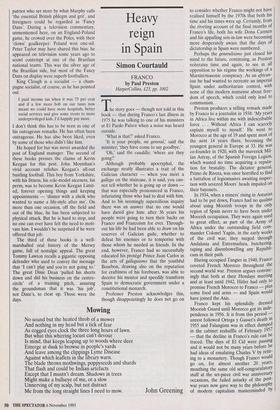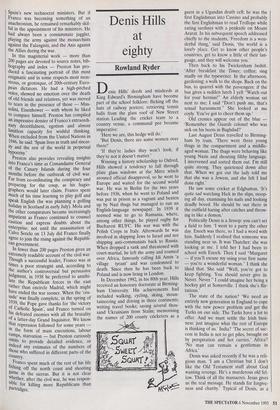Heavy reign in Spain
Simon Courtauld
FRANCO by Paul Preston HatperCollins, £25, pp. 1002 The story goes — though not told in this book — that during Franco's last illness in 1975 he was talking to one of his ministers at El Pardo Palace when a noise was heard outside.
'What is that?' asked Franco.
'It is your people, mi general,' said the minister; 'they have come to say goodbye.'
'Oh,' said the caudillo; 'where are they going?'
Although probably apocryphal, the exchange neatly illustrates a trait of the Galician character — when you meet a gallego on the staircase, it is said, you can- not tell whether he is going up or down — that was especially pronounced in Franco, infuriating those who had to deal with him. And to his seemingly supercilious inquiry there was an answer that no one would have dared give him: after 36 years his people were going to turn their backs on Franco and Francoism for ever. Through- out his life he had been able to draw on his reserves of Galician guile, whether to defeat his enemies or to temporise with those whom he needed as friends. In the end, however, Franco had so successfully educated his protégé Prince Juan Carlos in the arts of galleguismo that the youthful Bourbon, drawing also on the reputation for craftiness of his forebears, was able to deceive his mentor and speedily transform Spain to democratic government under a constitutional monarch.
Professor Preston acknowledges this, though disappointingly he does not go on to consider whether Franco might not have realised himself by the 1970s that both his time and his times were up. Certainly, from the riveting account of the final months of Franco's life, both his wife Dona Carmen and his appalling son-in-law were becoming more desperately aware that the days of dictatorship in Spain were numbered. Perhaps the generalisimo just closed his mind to the future, continuing, as Preston reiterates time and again, to see in all opposition to his regime the workings of a Marxist/masonic conspiracy. As an african- ista he had wanted to recreate an imperial Spain under authoritarian control, with none of this modern nonsense about free- dom of speech, which could only lead to communism.
Preston produces a telling remark made by Franco to a journalist in 1938: 'My years in Africa live within me with indescribable force . . . Without Africa I can scarcely explain myself to myself.' He went to Morocco at the age of 19 and spent most of the next 14 years there, becoming the youngest general in Europe at 33. He was co-founder in 1920, with the maverick Mil- ian Astray, of the Spanish Foreign Legion, which wasted no time acquiring a reputa- tion for brutality. The dictator general, Primo de Rivera, was once horrified to find a battalion of legionnaires awaiting inspec- tion with severed Moors' heads impaled on their bayonets.
In 1934, when a miners' rising in Asturias had to be put down, Franco had no qualms about using Moorish troops in the only region of Spain never to have been under Moorish occupation. They were again used to great effect, as part of the Army of Africa under the outstanding field com- mander Colonel Yagde, in the early weeks of the civil war; they surged through Andalusia and Extremadura, butchering, raping and disembowelling any Republi- cans in their path. Having occupied Tangier in 1940, Franco coveted French Morocco throughout the second world war. Preston argues convinc- ingly that both at their Hendaye meeting and at least until 1942, Hitler had only to promise French Morocco to Franco — plus some food and arms — and Spain would have joined the Axis. Franco kept his splendidly dressed Moorish Guard until Morocco got its inde- pendence in 1956. It is from this period — unrest followed Ortega y Gasset's death in 1955 and Falangism was in effect dumped in the cabinet reshuffle of February 1957 — that the decline in Franco's rule can be traced. The days of El Cid were passing and it would not be many years before he had ideas of emulating Charles V by retir- ing to a monastery. Though Franco would go on, for almost another 20 years, mouthing the same old self-congratulatory stuff at the set-piece civil war anniversary occasions, the failed autarky of the post- war years now gave way to the philosophy of modern capitalism masterminded by
Spain's new technocrat ministers. But if Franco was becoming something of an anachronism, he remained remarkably skil- ful in the appointment of his ministers. He had always been a consummate juggler, Playing the army against the monarchists against the Falangists, and the Axis against the Allies during the war.
In this magisterial work — more than 200 pages are devoted to source notes, bib- liography and index — Preston has pro- duced a fascinating portrait of this most enigmatic and in some respects most mon- strous, or grotesque, of 20th-century Euro- pean dictators. He had a high-pitched voice, showed no emotion over the death of old friends and relatives, yet was moved to tears in the presence of those — Mus- solini, Eisenhower — with whom he liked to compare himself. Preston has compiled an impressive dossier of Franco's extraordi- nary deceitfulness, egotism and almost limitless capacity for wishful thinking. When excluded from the United Nations in 1946, he said: 'Spain lives in truth and sincer- ity and the rest of the world in perpetual hypocrisy.'
Preston also provides revealing insights into Franco's time as Comandante General of the Canary Islands during the four months before the outbreak of civil war. Far from co-ordinating the conspiracy and Preparing for the coup, as his hagio- graphers would later claim, Franco spent much of his time learning to play golf and Speak English (he was planning a golfing holiday in Scotland in early July). Mola and the other conspirators became increasingly impatient as Franco continued to counsel caution and express doubts about the enterprise; not until the assassination of Calvo Sotelo on 13 July did Franco finally agree to join the rising against the Republi- can government.
In fewer than 200 pages Preston gives an extremely readable account of the civil war. rrh, ough a successful leader, Franco was at times a poor strategist and, according to the author's controversial but persuasive Judgment, in 1938 he preferred to annihi- late the Republican forces in the east rather than encircle Madrid, which might have ended the war sooner. When the 'cru- sade' was finally complete, in the spring of 1939, the Pope gave thanks for 'the victory of Catholic Spain', and Franco turned on hIs defeated enemies with all the brutality of a latter-day Grand Inquisitor. We know that repression followed for some years — in the form of mass executions, labour Camps, starvation — but Preston curiously Omits to provide detailed evidence, or indeed any estimates of the numbers of those who suffered in different parts of the Country.
• Franco spent much of the rest of his life fishing off the north coast and shooting game in the sierras. But it is not clear Whether, after the civil war, he was respon- sible for killing more Republicans than Partridges.











































































 Previous page
Previous page